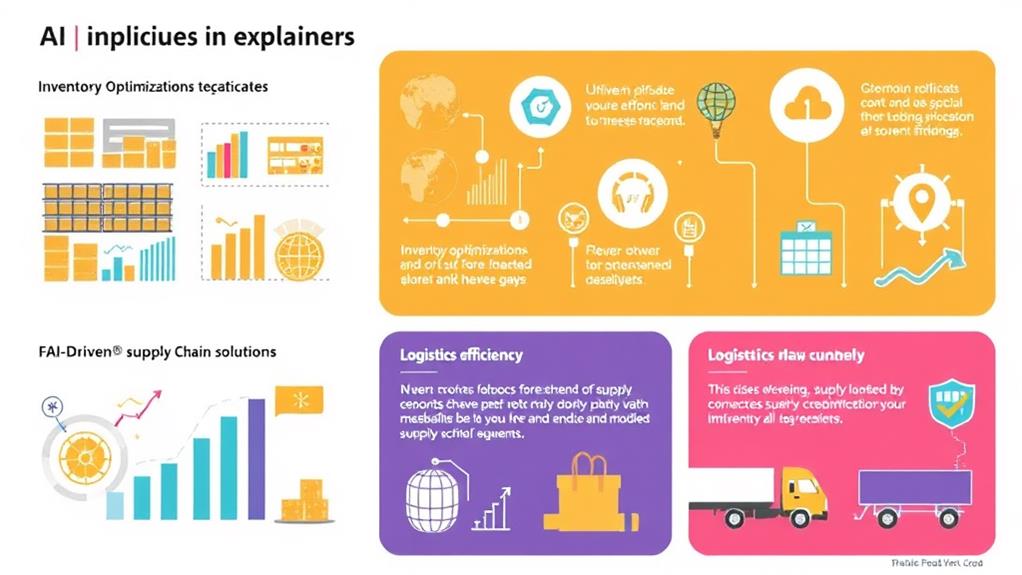How to Use AI to Improve SMB Supply Chain Management
To enhance supply chain management, SMBs can leverage AI technologies such as predictive analytics and inventory optimization tools. These solutions improve demand forecasting accuracy, providing insights that allow for timely decision-making and agile responses to market changes. Implementing real-time data analysis enhances inventory management by minimizing stockouts and overstock issues. Additionally, engaging stakeholders early guarantees smooth integration of AI systems. By evaluating current practices and selecting customizable technologies, SMBs can strategically optimize their supply chains. Exploring successful case studies reveals practical applications and future trends that can provide further insights into maximizing AI benefits.
Key Takeaways
- Implement predictive analytics to anticipate demand fluctuations and optimize inventory management for better operational efficiency.
- Utilize real-time data analysis to gain insights into inventory levels, suppliers, and customer demand for timely decision-making.
- Adopt AI-driven inventory optimization solutions to automate replenishment, minimizing stockouts and overstock situations.
- Perform a thorough assessment of current supply chain practices to identify inefficiencies and prioritize AI integration projects.
- Engage stakeholders early in the AI implementation process to foster collaboration and ensure acceptance of new technologies.
Understanding AI in Supply Chain

How can artificial intelligence transform supply chain management for small and medium-sized businesses (SMBs)? By understanding AI fundamentals, SMBs can effectively leverage technology to enhance supply chain integration, which is essential for streamlined operations.
Artificial intelligence encompasses a range of technologies, including machine learning, data analytics, and automation, all of which can optimize decision-making processes and reduce operational costs.
At the core of AI in supply chain management is the ability to analyze vast amounts of data in real-time. This capability allows SMBs to gain insights into inventory levels, supplier performance, and customer demand patterns.
By integrating AI-driven solutions, businesses can achieve enhanced visibility across their supply chains, delivering precise information that supports timely decisions. For instance, predictive analytics can identify potential disruptions before they impact operations, allowing for proactive measures that uphold service levels and customer satisfaction.
Furthermore, supply chain integration facilitated by AI can lead to improved collaboration among stakeholders. By utilizing AI tools that enhance data sharing and communication across supply chain partners, SMBs can build a more resilient and responsive network.
This technology not only fosters a culture of transparency but also empowers businesses to adapt swiftly to market fluctuations.
Benefits of AI for SMBs
The integration of AI into supply chain management presents significant advantages for small and medium-sized businesses (SMBs), particularly in enhancing forecasting accuracy and streamlining inventory management.
Enhanced Forecasting Accuracy
Leveraging AI technologies considerably enhances forecasting accuracy for small and medium-sized businesses (SMBs) within their supply chain management. By harnessing advanced algorithms, SMBs can analyze vast amounts of historical data and extract valuable insights, enabling them to anticipate market demands more effectively.
AI's capabilities in this arena provide several strategic advantages:
- Improved Data Insights: AI tools can process data from various sources, offering a holistic view that traditional methods often overlook.
- Recognition of Seasonal Trends: By identifying recurring patterns, AI can help SMBs predict fluctuations in demand linked to seasonal changes, optimizing inventory levels.
- Real-Time Analysis: AI continuously assesses data, allowing for immediate adjustments in forecasting based on real-time information, thereby enhancing responsiveness.
- Predictive Analytics: Utilizing machine learning, AI can forecast future trends based on past behaviors, enabling proactive decision-making.
Streamlined Inventory Management
Through the implementation of AI-driven solutions, small and medium-sized businesses (SMBs) can achieve streamlined inventory management that not only enhances operational efficiency but also maximizes resource allocation.
By leveraging automated replenishment systems powered by AI, SMBs can minimize stockouts and overstock situations, ensuring that inventory levels are maintained in accordance with demand fluctuations. This strategic approach enables businesses to maintain peak product availability while reducing excess carrying costs.
Real-time tracking capabilities are another critical advantage of AI in inventory management. With continuous monitoring and data analysis, SMBs can achieve unprecedented visibility into their inventory lifecycle, from procurement to sales.
This allows for more accurate inventory assessments and timely decision-making, enabling businesses to respond agilely to market conditions.
In essence, AI-driven solutions afford SMBs the freedom to focus on core business functions and customer engagement, rather than being mired in manual inventory management tasks.
Key AI Technologies to Consider

In the domain of supply chain management for small and medium-sized businesses (SMBs), leveraging key AI technologies can profoundly enhance operational efficiency and decision-making capabilities.
Predictive analytics tools, inventory optimization solutions, and demand forecasting models represent critical components that empower organizations to anticipate market fluctuations and manage resources more effectively.
Predictive Analytics Tools
Predictive analytics tools represent a critical innovation in supply chain management for small and medium-sized businesses (SMBs), enabling them to anticipate demand fluctuations and optimize inventory levels.
By leveraging predictive modeling, these tools empower businesses to make data-driven decisions, ultimately enhancing operational efficiency and customer satisfaction. The integration of data visualization further aids in interpreting complex datasets, allowing SMBs to identify trends and potential bottlenecks.
Here are four key components of predictive analytics tools that SMBs should consider:
- Demand Forecasting: Utilize historical data to predict future sales trends, thereby improving inventory management.
- Supplier Performance Analysis: Monitor and assess supplier reliability, helping to secure better terms and reduce disruptions.
- Market Trend Insights: Analyze market variables and consumer behavior for strategic decision-making and adaptive supply chain strategies.
- Risk Management: Identify potential risks in the supply chain, enabling businesses to develop contingency plans and safeguard against uncertainties.
Incorporating these predictive analytics tools not only provides SMBs the freedom to operate more strategically but also fosters a culture of informed decision-making.
Inventory Optimization Solutions
How can small and medium-sized businesses (SMBs) effectively manage their inventory to meet fluctuating demands while minimizing costs? Leveraging AI-driven inventory optimization solutions can greatly enhance inventory tracking and stock replenishment practices.
With real-time visibility into inventory levels, SMBs can navigate demand variability and reduce the risk of excess inventory, thereby improving overall inventory turnover rates.
Automated ordering systems enable businesses to streamline replenishment processes, ensuring that stock aligns closely with actual demand. By utilizing sophisticated inventory categorization methods, SMBs can gain insights into inventory valuation, allowing them to identify high-performing products and those that require strategic adjustment.
Supplier collaboration becomes essential, as sharing data on inventory metrics can lead to more responsive supply chain practices.
Through optimized inventory management, SMBs can enhance their operational efficiency, minimize carrying costs, and ultimately create a more agile supply chain. Empowered by AI technologies, businesses can achieve a holistic understanding of inventory dynamics, leading to informed decision-making that sparks growth, reduces waste, and fosters long-term resilience in an unpredictable market environment.
Demand Forecasting Models
Amidst the complexities of today's market dynamics, effective demand forecasting stands as a cornerstone for successful supply chain management in small and medium-sized businesses (SMBs).
The ability to anticipate fluctuations in demand can greatly mitigate the impact of demand variability, enabling more adaptive and strategic decision-making.
To enhance demand forecasting models, SMBs should consider the following approaches:
- Data Integration: Consolidate historical data from diverse sources to create a thorough view of sales patterns and customer behavior, ensuring that decisions are grounded in robust analytics.
- Algorithm Selection: Choose algorithms that can accurately model seasonal trends and variations, allowing for precise forecasts tailored to specific market conditions.
- Market Analysis: Conduct thorough assessments of the competitive landscape and economic indicators to refine forecasts and adapt to external factors influencing demand.
- Continuous Improvement: Implementing a feedback loop that incorporates actual sales performance against forecasts to iteratively refine models and improve accuracy over time.
Steps to Implement AI Solutions
Implementing AI solutions in supply chain management requires a strategic approach to guarantee that the technology aligns with business objectives and operational needs. The first step in this process is to conduct a thorough assessment of current supply chain practices. This evaluation should identify existing inefficiencies and areas that can benefit from AI technologies, ensuring that investment is targeted and measurable.
Next, organizations must carefully consider AI integration challenges. These challenges can range from data quality issues to the complexity of changing established workflows. Engaging key stakeholders early in the implementation process fosters collaboration, easing the shift and ensuring that the new technology is embraced rather than resisted.
Cost considerations also play a critical role in the implementation of AI solutions. Businesses should perform a detailed cost-benefit analysis, weighing the initial investment against potential operational improvements and cost savings. This analysis will help prioritize AI projects that promise the highest return on investment.
Once these foundational steps are completed, firms should focus on selecting the right AI technologies and partners. Customization and scalability of AI solutions must be prioritized to cater to specific business needs.
Following the selection, a phased implementation approach is advisable, allowing for the adjustment of strategies and processes based on feedback and data insights obtained during initial rollouts.
Case Studies of AI Success

Across various industries, numerous organizations have successfully harnessed AI technologies to enhance their supply chain management, leading to considerable operational improvements and competitive advantages.
The following case studies exemplify successful implementations that vividly illustrate the potential of AI in optimizing supply chain processes:
- Amazon: By leveraging AI algorithms for demand forecasting and inventory management, Amazon has refined its supply chain, reducing lead times and ensuring availability of products, thereby greatly enhancing customer satisfaction.
- Nestlé: This multinational food company implemented AI-driven analytics to optimize its logistics. The integration of real-time data into its operations has streamlined transportation routes, reduced costs, and improved delivery timelines, allowing Nestlé to adapt swiftly to market changes.
- Coca-Cola: Through AI, Coca-Cola has developed smart vending machines equipped with predictive analytics. These machines manage inventory levels and customer preferences, improving distribution efficiency and tailoring product offerings to local demand.
- Zara: The apparel retailer utilizes AI for rapid inventory analysis. By predicting fashion trends and analyzing sales data, Zara adjusts its supply chain dynamically, enabling a fast turnaround from design to market, thereby maintaining its competitive edge in the fast-fashion sector.
These industry examples underline how strategic deployment of AI technologies can yield transformative benefits.
They illustrate the critical role AI plays in not only streamlining operations but also enhancing decision-making and responsiveness in supply chain management.
Future Trends in Supply Chain AI
Embracing emerging technologies is set to redefine the landscape of supply chain management, particularly as advancements in AI continue to evolve. The future of supply chain AI will herald a new era characterized by a shift towards automated decision-making and intelligent logistics solutions. These capabilities promise not only operational efficiency but also enhanced adaptability to market fluctuations and customer demands.
One key trend to watch is the integration of AI-driven analytics that empower systems to learn from historical data, predict future trends, and make real-time optimizations. This means that businesses will rely less on human intuition and more on data-derived insights, fostering a culture of informed decision-making throughout the supply chain.
Moreover, intelligent logistics will evolve, prioritizing smart, autonomous solutions for transportation and distribution. Enhanced routing algorithms, combined with AI-enabled fleet management systems, will guarantee that goods are delivered in the most efficient manner possible, reducing costs and delivery times.
Significant advancements in Internet of Things (IoT) integration with AI will further enhance supply chain transparency, allowing businesses to monitor and track inventory levels and order deliveries in real-time.
As these trends unfold, small to medium-sized businesses that leverage AI will not only gain a competitive advantage but also experience greater operational freedom. Emphasizing automated decision-making processes and embracing intelligent logistics will enable them to respond swiftly to changing market dynamics, guaranteeing resilience and long-term growth.
In this evolving landscape, the strategic application of AI proves to be not just transformative but essential for a thriving supply chain.
Frequently Asked Questions
What Are Common Misconceptions About AI in Supply Chain Management?
Common misconceptions about AI in supply chain management often stem from pervasive AI myths and automation fears.
Many believe that AI will completely replace human roles, leading to job losses, when in fact, AI is designed to enhance decision-making and efficiency.
Another misconception is that implementing AI is prohibitively expensive for small businesses.
However, many AI solutions are scalable and cost-effective, allowing organizations to leverage technology without sacrificing autonomy or increased operational complexity.
How Does AI Handle Supply Chain Disruptions Effectively?
AI effectively addresses supply chain disruptions through predictive analytics and real-time monitoring.
By leveraging predictive models, organizations can forecast potential risks, such as demand fluctuations or supplier inconsistencies.
Real-time monitoring enables continuous assessment of supply chain activities, facilitating rapid response to unforeseen issues.
This proactive approach empowers businesses to mitigate interruptions, optimize resource allocation, and enhance operational resilience, ultimately fostering a more agile supply chain that can adapt to dynamic market conditions.
What Skills Do Employees Need to Work With AI Technologies?
In the domain of innovation, employees must cultivate a diverse toolkit to thrive alongside AI technologies.
Essential skills encompass AI literacy, enabling a fundamental understanding of its capabilities and implications. Proficiency in data analysis is equally vital, empowering employees to derive actionable insights from vast datasets.
Additionally, strong communication and adaptability skills will enhance collaboration among teams, ultimately fostering an environment where creativity and analytical reasoning coexist, paving the way for strategic decision-making.
How Can SMBS Evaluate AI Vendors Before Choosing a Solution?
In evaluating AI vendors, SMBs should adopt a strategic approach to vendor selection, examining each vendor's expertise, reputation, and the compatibility of their offerings with business needs.
It is crucial to analyze solution suitability by considering factors such as scalability, integration capabilities, and customer support.
Conducting thorough due diligence, including reference checks and pilot programs, will enhance decision-making, ensuring the chosen vendor aligns with the organization's goals and fosters future growth.
What Data Privacy Concerns Should SMBS Consider When Using Ai?
When traversing the intricate maze of AI, SMBs must prioritize data privacy to safeguard their assets, akin to a fortress protecting its treasures.
Key concerns include data encryption, which secures sensitive information from breaches, and ensuring regulatory compliance with laws such as GDPR.
SMBs should conduct thorough assessments of their vendors' data handling practices, ensuring that robust protocols are in place to maintain client trust while harnessing the benefits of AI technologies.
Conclusion
The integration of artificial intelligence into supply chain management can greatly enhance operational efficiency for small and medium-sized businesses. By leveraging key technologies such as machine learning, predictive analytics, and automation, SMBs can optimize inventory management, forecast demand accurately, and streamline logistics. The adoption of AI solutions ultimately leads to cost reductions and improved decision-making capabilities. As the landscape of supply chains evolves, embracing AI stands as a strategic imperative for maintaining competitiveness and ensuring sustainability in an increasingly complex market.



